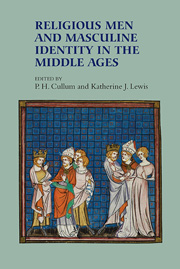Book contents
- Frontmatter
- Contents
- List of illustrations
- Contributors
- Acknowledgements
- Introduction
- From salve to weapon: Torah study, masculinity, and the Babylonian Talmud
- Gender and hierarchy: Archbishop Hincmar of Rheims (845–882) as a religious man
- The defence of clerical marriage: Religious identity and masculinity in the writings of Anglo-Norman clerics
- Writing masculinity and religious identity in Henry of Huntingdon
- ‘The quality of his virtus proved him a perfect man’: Hereward ‘the Wake’ and the representation of lay masculinity
- Episcopal authority and gender in the narratives of the First Crusade
- ‘What man are you?’: Piety and masculinity in the vitae of a Sienese craftsman and a Provençal nobleman
- ‘Imitate, too, this king in virtue, who could have done ill, and did it not’: Lay sanctity and the rewriting of Henry VI's manliness
- John of Bridlington, mitred prior and model of the mixed life
- Why men became monks in late medieval England
- Feasting not fasting: Men's devotion to the Eucharist in the later Middle Ages
- Index
Writing masculinity and religious identity in Henry of Huntingdon
Published online by Cambridge University Press: 05 September 2013
- Frontmatter
- Contents
- List of illustrations
- Contributors
- Acknowledgements
- Introduction
- From salve to weapon: Torah study, masculinity, and the Babylonian Talmud
- Gender and hierarchy: Archbishop Hincmar of Rheims (845–882) as a religious man
- The defence of clerical marriage: Religious identity and masculinity in the writings of Anglo-Norman clerics
- Writing masculinity and religious identity in Henry of Huntingdon
- ‘The quality of his virtus proved him a perfect man’: Hereward ‘the Wake’ and the representation of lay masculinity
- Episcopal authority and gender in the narratives of the First Crusade
- ‘What man are you?’: Piety and masculinity in the vitae of a Sienese craftsman and a Provençal nobleman
- ‘Imitate, too, this king in virtue, who could have done ill, and did it not’: Lay sanctity and the rewriting of Henry VI's manliness
- John of Bridlington, mitred prior and model of the mixed life
- Why men became monks in late medieval England
- Feasting not fasting: Men's devotion to the Eucharist in the later Middle Ages
- Index
Summary
In 1125 the papal legate John of Crema arrived in England where he presided over an ecclesiastical council held at Westminster. At this council, according to the twelfth-century chronicler Henry of Huntingdon, John
dealt most severely with the matter of priests’ wives, saying that it was the greatest sin to rise from the side of a whore and go to make the body of Christ. Yet, although on the very same day he had made the body of Christ, he was discovered after vespers with a whore. This affair was very well-known and could not be denied. The high honour which he had enjoyed everywhere was transformed into utter disgrace. So he retreated to his own land, confounded and discredited by the judgment of God.
The apparent glee with which Henry tells this story adds new vitality to the idiom about the pot calling the kettle black. However this narrative episode does have more serious undertones. Right at its heart is the question of clerical celibacy and how far this was a marker of religious identity for men like the papal legate and the English chronicler. The public shaming of John after he was caught in bed with a woman despite his earlier denunciations suggests that sex and sexual behaviour was problematic and even a source of tension for religious men at this time. It also highlights that religious reform was a live issue in twelfth-century England given the legate's earlier criticism of those priests who were married.
- Type
- Chapter
- Information
- Religious Men and Masculine Identity in the Middle Ages , pp. 64 - 76Publisher: Boydell & BrewerPrint publication year: 2013



